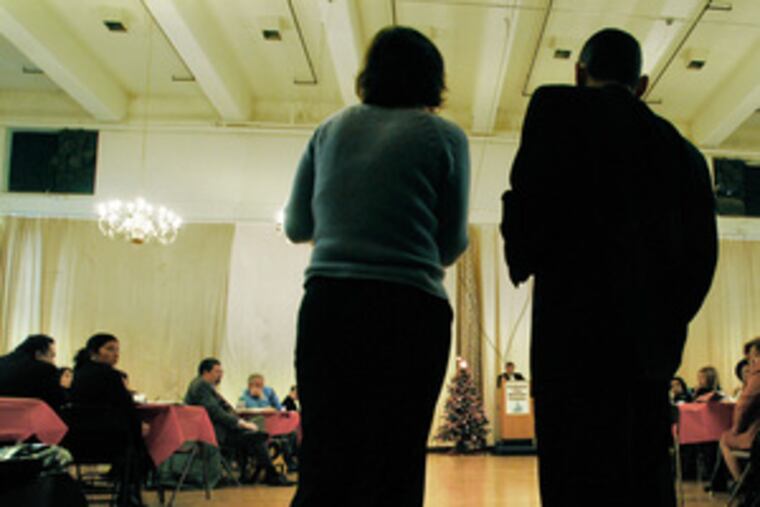Seeking to clarify immigration policy
When the New Jersey attorney general ordered police to alert federal officials to illegal immigrants arrested for serious offenses, Camden's Hispanic leaders were concerned.

When the New Jersey attorney general ordered police to alert federal officials to illegal immigrants arrested for serious offenses, Camden's Hispanic leaders were concerned.
Local law enforcement officials were, too.
Would the measure hurt relations between police and the immigrant community? Would victims and witnesses remain silent for fear that their residency status might be challenged? And would police exploit the directive to root out those guilty of nothing more than an immigration violation?
Yesterday, officials explained the measure and calmed nerves at a forum - possibly the first in the state - held before a predominantly Latino audience in Camden.
Some Hispanic leaders and immigration advocates called for the measure's revision and training of officers, and others advocated its elimination.
Attorney General Anne Milgram's order to police on Aug. 22 was not intended to discourage immigrant victims or witnesses from coming forward, said acting Camden County Prosecutor Joshua Ottenberg, whose office sponsored the forum with the Camden Police Department.
"Local law enforcement is not in the immigration business," Ottenberg said. "We are in the solve-the-crime business."
Milgram's edict came after the Aug. 4 slayings of three college students in a Newark schoolyard allegedly by a group who included two undocumented residents out on bail.
In the case of at least one of the men, police involved in the earlier arrest never questioned his immigration status. Had they done so, he might not have been free.
Under the directive, local police who arrest someone for a serious offense, including driving while intoxicated, must inquire about the suspect's citizenship, nationality and immigration status.
Under the old system, some police departments made the inquiries and others did not.
According to the edict, if an officer has reason to believe the suspect is not legally in the United States, "he shall, during the booking process," notify Immigration and Customs Enforcement agents. The federal authorities can then detain the suspect pending a deportation hearing.
Ottenberg said he believed the new measure had made some in New Jersey's Hispanic community, especially the undocumented, afraid to cooperate with police.
Asking someone if he or she is a legal resident "is a booking question after you're charged," he assured an audience of about 80 people, including representatives of many civic groups, at the Cathedral of the Immaculate Conception on Market Street.
The question is not asked of victims, witnesses or others interviewed in a criminal investigation, Ottenberg said.
After an arrest, he said, "the judge needs to know the information." When bail is set, "the ties to the community are important - whether you have a job, family, and go to school. It's given so you know if there is a risk of flight."
If the suspect is an illegal resident, that information "will eventually make it to federal immigration authorities," Ottenberg said. "And recently, they have been trying to speed up that pipeline."
Members of the Hispanic community, such as Victoria Walter, said yesterday that they did not see the need for the directive and called for its elimination.
"Ninety percent of our parishioners are immigrants. We have 600 every Sunday," said Walter, a native of the Dominican Republic who works as a social outreach coordinator at the predominantly Hispanic St. Anthony's of Padua Roman Catholic Church in Camden's Cramer Hill section. "I'm concerned because this could affect them."
Mistakes have already been made.
Last month, Milgram reprimanded the Newark Police Department after an officer improperly questioned witnesses at a crime scene in September about their immigration status. Milgram recommended that the officer be disciplined and that all Newark officers be trained in administering the directive.
"We indicated from the beginning that our concern was the law of unintended consequences," said Shai Goldstein, executive director of the New Jersey Immigration Policy Network, a nonprofit immigration advocacy group. "That's exactly what happened in Newark."
Goldstein, a former prosecutor in Atlantic County, said he would like to "see the directive suspended and not take effect until it is revised and training is completed."
Specifically, he said, he would like information about illegal residency withheld from Immigration and Customs Enforcement unless there is an indictment.
Problems can be avoided with training of officers, said Derek de Cosmo, a Woodbury immigration lawyer. "We need the resources to make sure the policy is implemented to protect people's civil rights.
"My problem is not with the policy parameters, but with implementation. There will be immigrant victims of crime who will be afraid to come forward and witnesses who will be afraid to come forward."
That is exactly what they hope to avoid, Camden police said.
"Once they have been robbed or stabbed, they should not fear they are going to be victimized again," Camden Police Supersession Executive Arturo Venegas Jr. said. "We are here not as immigration agents but as professional law enforcement providers. We're here to bring culpable people to justice."